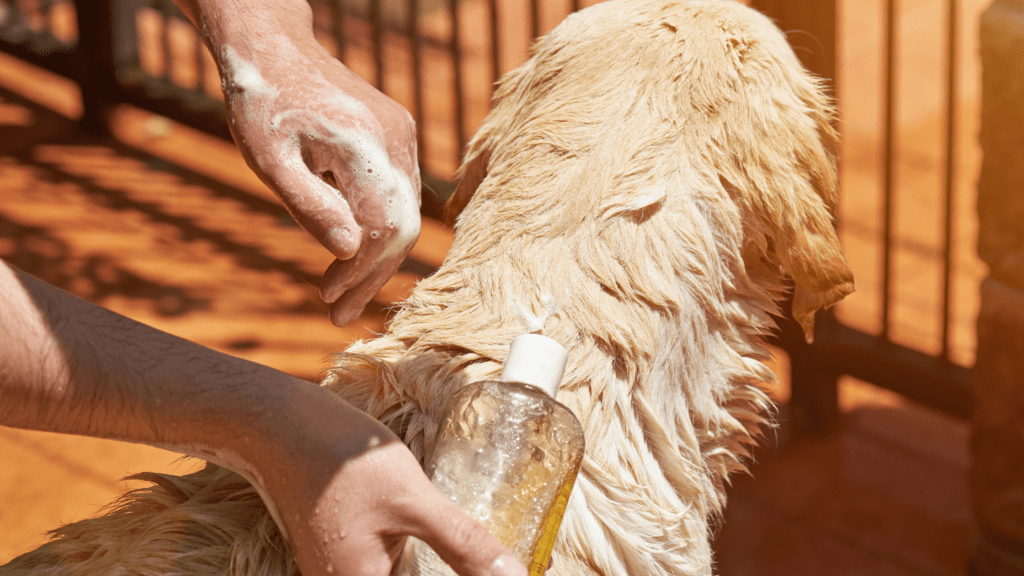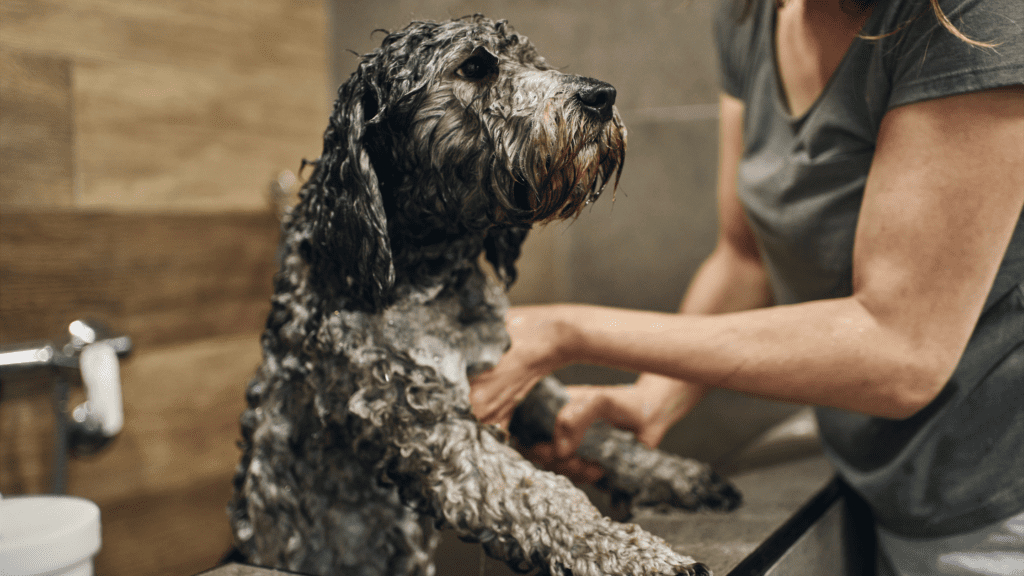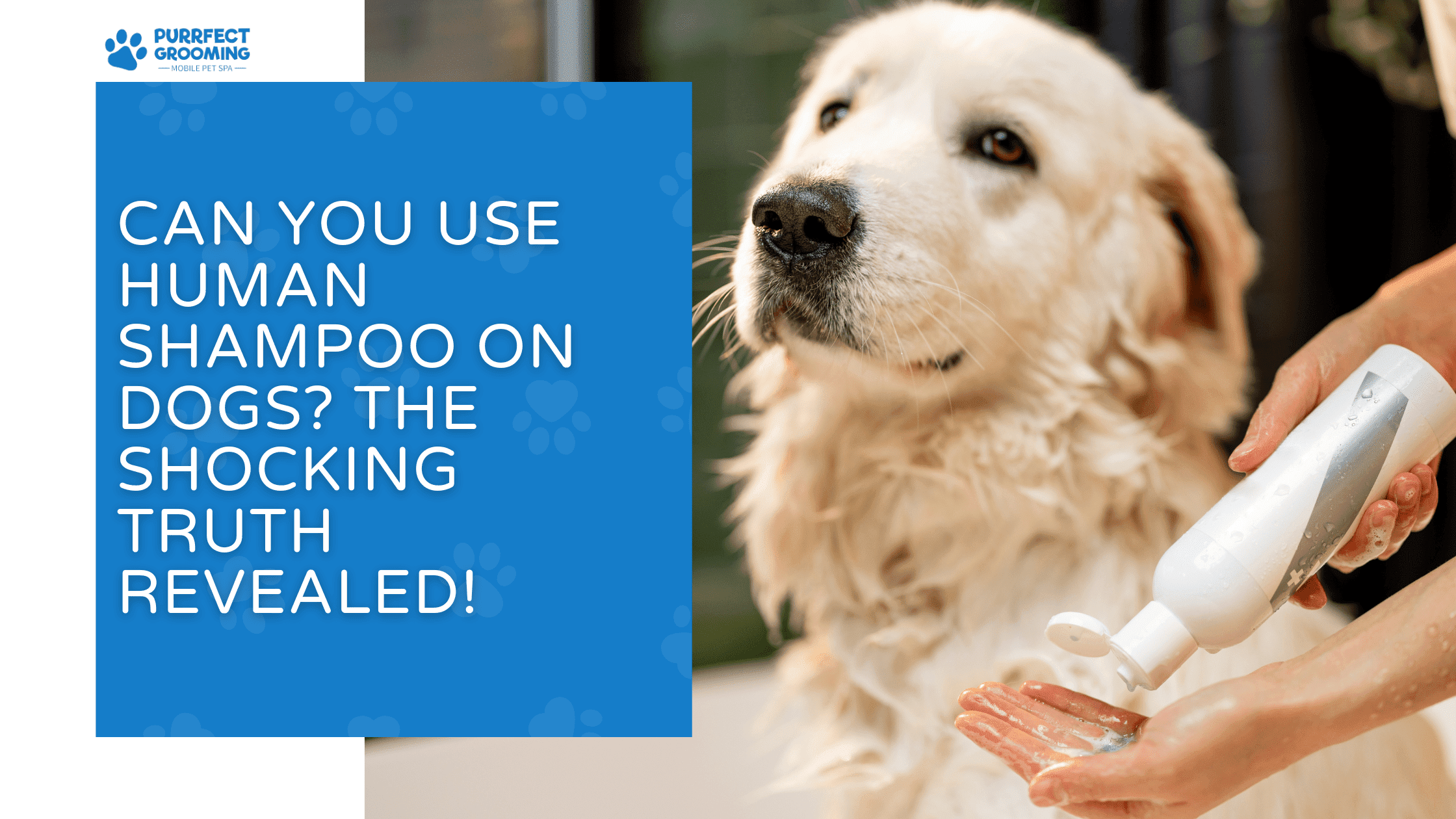Can You Use Human Shampoo on Dogs? The Shocking Truth Revealed!
A common question many pet owners ask is: “Can I use human shampoo on my dog?” or “Can you use regular shampoo on dogs?” While it may seem like a harmless solution when you run out of dog shampoo, using human shampoo on dogs can actually be harmful to their skin and coat.
Dogs have a higher skin pH than humans, ranging from 6.2 to 7.4, while human skin is more acidic at 5.5. This difference makes human shampoo unsuitable for dogs, as it can strip their natural oils and lead to irritation, dryness, and bacterial infections (Source: American Kennel Club).
In this guide, we will discuss why human shampoo is bad for dogs, when it might be used in an emergency, and the best alternatives for keeping your pet clean and healthy.

Understanding the Difference Between Human and Dog Skin
Why Dogs Have a Different pH Balance
Dogs’ skin is naturally more alkaline, which helps them fight bacteria and maintain moisture. The acidic nature of human shampoos can disrupt this balance, leading to skin dryness, itchiness, and infections.
| Comparison | Human Skin | Dog Skin |
| pH Level | 5.5 (Acidic) | 6.2 – 7.4 (Neutral) |
| Oil Production | More sebum | Less sebum |
| Sensitivity to Irritants | Lower | Higher |
Using human shampoo on dogs removes their natural protective oils, making their skin more susceptible to bacteria, yeast, and fungal infections.
Can You Use Human Shampoo on Your Dog?
Short-Term and Long-Term Effects
If you’ve used human shampoo on your dog once or twice, you may not see immediate problems. However, over time, the following issues can develop:
✅ Short-Term Effects:
- Dry, flaky skin
- Redness and itching
- Dull coat
❌ Long-Term Effects:
- Increased risk of skin infections
- Chronic irritation and allergies
- Excessive shedding and hair breakage
Using human shampoo frequently can lead to serious skin conditions like dermatitis and bacterial overgrowth.
Can You Use Regular Shampoo on Dogs?
Harmful Chemicals in Human Shampoos
Many human shampoos contain harsh chemicals that can harm your dog’s skin.
| Ingredient | Effect on Dogs |
| Sulfates (SLS, SLES) | Strips natural oils, causing dryness |
| Parabens | Linked to hormonal imbalances |
| Artificial Fragrances | Can cause allergies and respiratory issues |
| Alcohol | Dries out skin and fur |
Even shampoos labeled as “organic” or “natural” for humans may contain essential oils like tea tree or citrus, which are toxic to dogs.
Can Dogs Use Human Shampoo in an Emergency?
If you absolutely have no dog shampoo available, using human shampoo once is not deadly—but it should be done with caution.
How to Minimize Risks If You Must Use Human Shampoo
✔️ Choose a fragrance-free, mild baby shampoo
✔️ Dilute it with water to reduce harshness
✔️ Rinse your dog thoroughly
✔️ Apply a dog-friendly conditioner afterward to restore moisture
However, this should only be a one-time emergency solution.

Safe Alternatives to Human Shampoo for Dogs
Natural and DIY Alternatives
If you don’t have dog shampoo, you can try these safe homemade alternatives:
| Alternative | Benefits |
| Oatmeal & Water | Soothes itchy skin |
| Apple Cider Vinegar & Water | Balances pH, kills bacteria |
| Aloe Vera & Coconut Oil | Moisturizes and protects skin |
Best Commercial Dog Shampoos
| Brand | Features |
| Earthbath | Hypoallergenic, made with natural ingredients |
| Burt’s Bees | Gentle, tear-free formula |
| Vet’s Best | Anti-itch formula with essential oils |
Investing in a good-quality dog shampoo is always better than risking your pet’s skin health.
How Often Should You Bathe Your Dog?
Factors That Determine Bathing Frequency
- Coat Type: Short-haired breeds need fewer baths
- Lifestyle: Active dogs need more frequent cleaning
- Skin Conditions: Dogs with allergies require special care
Recommended Bathing Schedule
| Dog Coat Type | Bathing Frequency |
| Short-haired dogs | Every 4-6 weeks |
| Long-haired dogs | Every 2-4 weeks |
| Dogs with skin issues | As recommended by a vet |
Bathing your dog too often can strip their essential oils, so it’s important to use the right shampoo.
You May Also Like : Dog Bathing-Prepare Your Dog For A Bath
Can You Use People Shampoo on Dogs? Expert Opinions
Veterinarians and Groomers Weigh In
Most pet professionals strongly advise against using human shampoo on dogs. According to Dr. Jerry Klein, Chief Veterinary Officer of the AKC, human shampoos can irritate and dry out a dog’s skin, leading to chronic discomfort and infections.
Scientific Studies on Shampoo Use for Dogs
Studies have shown that dogs bathed with human shampoo exhibit higher levels of skin irritation compared to those washed with dog-specific shampoos.
Pro Tips for Proper Dog Grooming
Best Practices for Bathing Your Dog
✔️ Use lukewarm water to avoid drying out the skin
✔️ Massage the shampoo gently into the coat
✔️ Rinse thoroughly to prevent residue buildup
✔️ Dry your dog completely to prevent fungal infections
How to Keep Your Dog’s Skin Healthy Between Baths
- Brush their coat regularly to remove dirt and dander
- Use pet wipes for quick clean-ups
- Provide a balanced diet to maintain coat health
Conclusion
So, can you use human shampoo on dogs? The answer is NO. While a single-use in an emergency may not cause immediate harm, frequent use can lead to serious skin problems. Always opt for dog-safe shampoos or natural alternatives to keep your pet’s coat clean and healthy.
Pro Tip:
Always do a patch test before using any shampoo on your dog. Apply a small amount and wait 24 hours to check for reactions!healthy.
FAQs
1. Can I use baby shampoo on my dog?
Baby shampoo is gentler than regular human shampoo but still not ideal for dogs due to pH differences.
2. What should I do if my dog reacts to human shampoo?
Rinse your dog with water and apply a dog-safe soothing product like aloe vera.
3. Is there any human shampoo that’s safe for dogs?
In emergencies, sulfate-free and fragrance-free shampoos might be safer, but it’s best to avoid using them regularly.
4. How often should I bathe my dog?
Most dogs benefit from a bath every 4-6 weeks, depending on their coat type and activity level.
5. Can I make homemade dog shampoo?
Yes, mixing water, mild soap, and apple cider vinegar can be a temporary solution if dog shampoo is unavailable.
